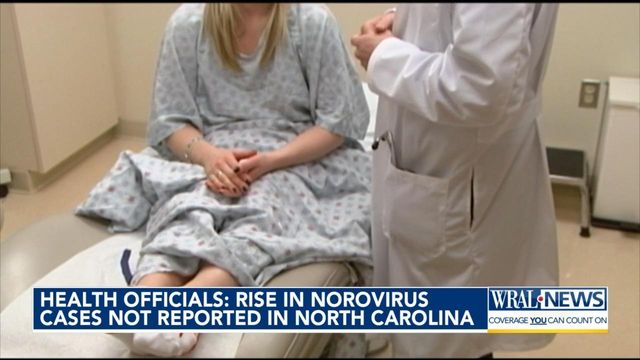Norovirus outbreak in Northeast not unusual, health experts urge handwashing to reduce spread
The highly contagious stomach virus norovirus has been spreading in the Northeastern U.S. for months.
According to the Centers for Disease Control and Prevention, the latest data reported last week showed an average of 13.4% of tests were positive for norovirus.
WakeMed Infection Prevention Specialist Jessica Dixon said it’s not uncommon for the Northeast to see a seasonal viral outbreak before southern regions.
“I think the Northeast tends to be a leader if you look at the data, so it is probably likely that we'll continue to see an increase in these cases over the next few weeks, which is not unusual,” said Dixon.
Dixon says norovirus typically peaks this time of year but adds WakeMed hasn't seen anything abnormal that would be cause for heightened concern.
The WakeMed system saw 18 positive cases of norovirus last week compared to nine the week prior.
UNC Health also reported a mild increase over the winter of cases. All hospitals in Chapel Hill saw just 3 cases in November, 16 cases in December and 17 as of January 2024.
A spokesperson for the North Carolina Department of Health and Human Services told WRAL News, “We are not seeing outbreaks due to norovirus being reported above the normal levels for North Carolina compared to previous years.”
In a statement, the CDC also tells WRAL News as a whole, “data from the southern region of the United States also look similar to what we would expect for this time of year.”
Norovirus tends to resolve for most people within a few days.
Dixon says symptoms are like other stomach bugs and include cramping, stomach aches, vomiting and diarrhea.
It is recommended to eat bland foods and increase fluid intake through water and drinks with electrolytes.
“You can also have those kinds of secondary signs and symptoms related to dehydration if you’re not able to stay hydrated while you’re ill. You can feel weak you can feel lightheaded and dizzy and woozy,” Dixon said.
Norovirus is not killed by all disinfectants which makes prevention difficult.
Dixon recommends reading labels carefully and purchasing cleaners that are bleach-based.
Frequent handwashing, especially before meals, is also important with reducing spread.
“It is transmitted by the fecal-oral route,” explained Dixon. “When someone has norovirus and they’re vomiting or they have diarrhea, they contaminate their hands and they contaminate their environment. If you come behind them and touch something they’ve touched or touch the space they’ve been in, you get those viral particles on your hands.”
The healthcare professional says those most at-risk for hospitalization are young children, older adults, and those who are immunocompromised.
"You need to stay away from people until about 48 hours after your symptoms resolved ideally, especially if you are involved in any kind of food preparation," said Dixon.













